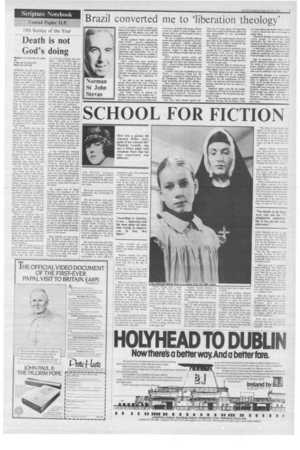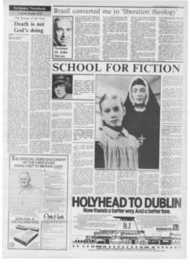Page 5, 25th June 1982
Page 5

Report an error
Noticed an error on this page?If you've noticed an error in this article please click here to report it.
Tags
Share
Related articles
A Convent Schoolgirl’s Tale
Acharterhouse,. Chronicle
Far From Showing Real Life, John Beyer Believes That
Tv And Radio By Tom Castro
Looking And Listening
SCHOOL FOR FICTION
THE RECENT television dramatisation of Antonia White's semi-autobiographical sequence of four novels Frost In May, drew much well deserved acclaim from the critics.
But it also revived some of the controversy that surrounded its publication.
The old questions were again raised: how can a religion be beneficial if it causes such suffering? Surely an education like that received by Antonia White (Nanda Gray in the novels) must produce only guilt and insecurity?
In fact, Antonia White's lucid description of her years in the Sacred Heart Convent, from which she was expelled for writing a "lurid" book, followed by her unhappy adolescence and eventual breakdown has given much ammunition to critics of the Catholic faith.
But was it really like that? One person with first-hand knowledge — she was at the convent in Roehampton, South London, at the same time as Antonia White — is Majorie Castelli, and she remembers a very different
atmosphere than that protrayed in Frost in May.
"The nuns were not attempting to improve us and our spiritual lives all the time, as the book suggests. Sometimes they were _great fun,--The—tne-moryt-ha always comes back to me is of the games of 'Cash' (a version of hide and seek) we used to play, with a breathless nun followed by her perspiring band, tearing along the Middle Gallery in a desperate attempt to reach Princess Gate and 'home' before being caught by the opposing team."
'According to Antonia, it was ... oppressive and the nuns spent all their time trying to improve you. In fact, they didn't.'
"You wouldn't get many children — or nuns —playing that today," she added, smiling at the memory.
Marjorie Castelli, now many years a grandmother, went to Roehampton in 1912 at the age of seven and left at the age of seventeen.
She was just a few years younger than Antonia White, or Irene Botting as she then was, and still has a clear picture of the emerging novelist.
"She was very clever, brilliant I would say. But she was never an ordinary 'happy-go-lucky' child. In fact. I don't think she ever fitted into the school, partly because she didn't come until later than most of us, she was thirteen or fourteen I think; partly because her father was a convert, and I'm afraid converts were rather looked down on; and partly because she was always very withdrawn."
Mrs Castelli agreed that all the details in the book were true, and that the television adaptation was very authentic, but it was not the complete story, she says. "Many thIngs don't come across in the novel or the television series. According to Antonia White, it was all very narrow and oppressive and enclosed and the nuns spent all their time trying to improve you. In fact, they didn't. That's all nonsence."
"Antonia brings in about how one of the nuns died and she was terrified of going into the room with the body — the girls were allowed to go in. That was true, but I don't remember feeling terrified at going, although some of the girls did."
Majorie Castelli admitted to having been very thick-skinned as a child, and quite capable of shrugging off some of the worst punishments -meted out to the girls.
"I remember one punishment I had. I'd spilt something on my uniform — so I was dressed by one of the nuns in two 'penance pinafores', which were just old rags. I was very upset at that. My parents came to see me and they were very angry, so I was whisked off immediately and put back into my ordinary uniform: But I soon got over it. I suppose it was strict, looking back. But it didn't seem so them."
In another incident, Majorie Castelli and her "gang" found a dead bird in the garden. Having decided to give the bird a Christian funeral one of the girls pointed out that they would have to baptise the bird first.
"Some of the girls took it very seriously, but to me it was just fooling. We stole some Holy Water from the Chapel, and conducted our version of a baptism service. But one of us had pangs of conscience, and went and told the Mother Superior.
"We were all summoned and asked "is this really true?" We were given a lecture about how disgraceful it was to bring the sacraments in to disrepute, and we all had to go to confession. Later, we had to laugh about it all."
Majorie Castelli remembers one particularly dramatic moment in the recent television series that brought back a flood of memories from her school days. It was the shadow of a nun crossing the dormatory ceiling.
"I remember the jet gaslighting made the nun's shadow very eerie," she said. "I saw it every night, but I can't remember being frightened because I knew what it was."
Many of the stories she had to tell about convent life were
extxem 0 .141 11. as ■ sense of humour must have been one of her most important assets in surviving the course unscathed.
She remembers, for example, the absurdity of the chemises the girls were expected, for modesty's sake, to wear in the bath, and
which billowed up into a huge balloon when the air got beneath them; and she remembers praying during the First World War for the Zeppelins to come over and bomb the convent so that the nuns would give the girls hot chocolate.
But she also remembers the sarcasm of some of the nuns, something she remains sad about to this day. This came over in the television serial.
"One nun, who I recognised, said to Antonia: "You think you are a very good little girl, don't you?" But, the way she said it she meant — the Lord doesn't like that kind of goodness. He likes something hard. Your character must be broken. Think of St John of the Cross and St Teresa'. That kind of conversation was true in a way, and I think it did effect one to a certain extent.
"Also the French nun who comes into the TV series — you see who it is meant to be, Mother Moreau. But she was exaggerated. She used to speak broken English and tell us hair raising stories about freemasons in France, which half terrified and half thrilled us."
Did she think convent education left scars of insecurity and guilt. "On me? No, just the opposite," she said.
blog comments powered by Disqus











